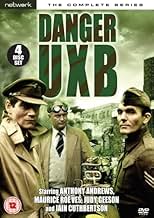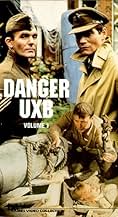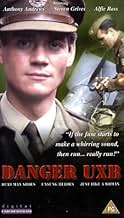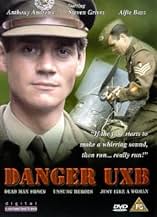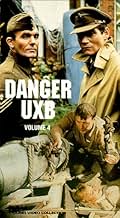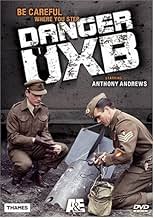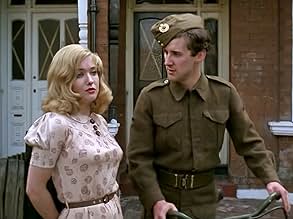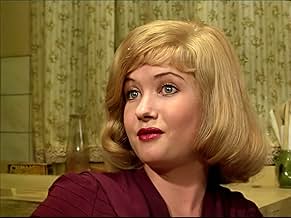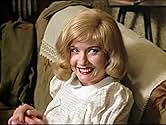Danger UXB
- Fernsehserie
- 1979
- 1 Std.
IMDb-BEWERTUNG
8,4/10
1134
IHRE BEWERTUNG
Füge eine Handlung in deiner Sprache hinzuThe series chronicles the exploits of the fictional Royal Engineer Tunnelling Company 97, which has been made a bomb disposal unit to deal with the thousands of unexploded bombs ("UXBs") in ... Alles lesenThe series chronicles the exploits of the fictional Royal Engineer Tunnelling Company 97, which has been made a bomb disposal unit to deal with the thousands of unexploded bombs ("UXBs") in London during the Battle of Britain.The series chronicles the exploits of the fictional Royal Engineer Tunnelling Company 97, which has been made a bomb disposal unit to deal with the thousands of unexploded bombs ("UXBs") in London during the Battle of Britain.
Folgen durchsuchen
Empfohlene Bewertungen
For me, personally, this is one of those shows that will always be my favourite.
Nowadays, such type of shows don't exist even remotely, as in these times in the name of making the show so called 'realistic', they make it either kind of too depressing or just into something really stupid!
After all, a tv show or movie's one of the main purposes is to connect with the audience in the best way possible.
For instance, this show has everything, it's realistic, i mean uncannily realistic, it has got humour, it has got romance, it's unpredictable and has really got an element of surprise to it, in short it has got everything, a show of this genre must have, but the difference in this show is that the way in which it has attempted to tell the story of these brave men has a certain charm and understanding to it, which the today's shows thoroughly lack( at least I feel that way)!!
According to me, it deserves an even higher rating.. seriously!
By now, anyone who hasn't seen this incredible series but has drifted across the reviews here with know that this amazing series is about an ordnance unit in Britain during the worst days of World War II as the Germans dreamed up increasingly ingenious bombs for killing British citizenry. As you follow individual members of the unit through the vicious business of trying to outsmart inventors whose main objective in life is killing if not civilians then the bomb-disposal experts, you can't help but cringe every second that one of the UXB heroes is working on a bomb. This is real-life, gut-wrenching drama at its best. Any of those bombs can go up at any second - and some of them do. With well-delineated characters which we can empathize with, this was one series that I went so far as requesting The History Channel to repeat. I thought I'd died and gone upstairs when they actually did. You won't want to miss a single episode, and you'll grip the edge of the chesterfield and clench your teeth as they try to deal with the fascinating array of different bombs. Way to go, Mr. Hawkesworth!!
This is an outstanding story of a British EOD (Explosive Ordnance Disposal) Detachment during World War II. The ordnance depicted along with the fusing used was actually used by the Germans during WWII. The methods used in the show are the actual (in some cases, trial and error) procedures used to defeat the ordnance during WWII.
The RSP (render safe procedures) used today for foreign ordnance is usually classified. The main reason for this is so the enemy doesn't know that you can defeat his weapons. The British, during WWII, initially published that they defeated certain German ordnance and the RSP used as a morale booster for the citizens. The Germans, reading these accounts, then designed some of the fuses with booby traps specifically designed to kill the British EOD soldiers while they were working on the UXBs if they followed the published procedures.
During WWII, the US Army EOD was modeled after the British detachments. Initially, the US turned to the British for training and help in getting our own EOD units established.
One of my greatest joys from this series was the fact that I had taped it the first time I watched and then got to watch it over again with a close friend. The significance of this was: 1) I was US Army EOD, and 2) the close friend was a British EOD tech who had been awarded the George's Medal for his EOD work in Northern Ireland. To show what a tight knit group EOD personnel are - we still stay in touch with one another via the Internet after 26 years (we watched the show together in 1983).
The RSP (render safe procedures) used today for foreign ordnance is usually classified. The main reason for this is so the enemy doesn't know that you can defeat his weapons. The British, during WWII, initially published that they defeated certain German ordnance and the RSP used as a morale booster for the citizens. The Germans, reading these accounts, then designed some of the fuses with booby traps specifically designed to kill the British EOD soldiers while they were working on the UXBs if they followed the published procedures.
During WWII, the US Army EOD was modeled after the British detachments. Initially, the US turned to the British for training and help in getting our own EOD units established.
One of my greatest joys from this series was the fact that I had taped it the first time I watched and then got to watch it over again with a close friend. The significance of this was: 1) I was US Army EOD, and 2) the close friend was a British EOD tech who had been awarded the George's Medal for his EOD work in Northern Ireland. To show what a tight knit group EOD personnel are - we still stay in touch with one another via the Internet after 26 years (we watched the show together in 1983).
I rembered this series on its first transmission in 1979.Many viewers at that time would remember the blitz first hand.I purchased the dvd some years ago,and it has had a recent airing on TPTV. Just as good as ever.Marvellous to see Kathleen Harrison in one of her last roles.It it feels so authentic and gives an idea of the science involved without it ever becoming dull.
I just saw it on video 20 years after first watching it on PBS. Great storytelling, great acting, great writing. John Hawkesworth made this well: he neither missed nor flubbed a detail, nor did he insert any improbable or cliched lines or angles. The actual stories themselves are simple enough: a few romances, comradery among the old boys, mateship among the men, a commanding idiot, the proverbial English eccentric ...
But hanging over all their heads - literally - is the Nazi Blitz and its delayed-fuse calling-cards in particular. The fuses kept changing, forcing the engineers to respond to them.
Hawkesworth didn't cop the "budget restraints" plea with "Danger UXB" like so many others would have done; he used what he could get to their fullest. He used the actual techniques used by EOD, RE, in exact detail, using real defused German bombs. I could almost feel the cold mud, a dull counter-part to the sheer terror.
Period pieces are 100% dependent on the details to give their full effect. A wrong uniform, a 50-star flag in the 1940s, an anachronistic hairstyle or remark or attitude gives it all away every time. Hawkesworth gives nothing away in "Danger UXB;" he neither exaggerates nor underplays anything, nor does he throw in a "portent of the future" or "meeting the historical figure."
As for the actors: superlatives won't do them justice. Talent abounds in well-written parts, great and small, with no room for star-tripping anywhere. Every role depends upon with whom they interact. About the only one I thought *may* have been short-shrifted was Maurice Röeves as Sgt. James; he seemed to be chomping on the bit to do more than bark orders, nurse the men or flip a coin through his fingers in a pub. Still, he was thoroughly believable as the backbone of Section 347.
So: I liked it.
But hanging over all their heads - literally - is the Nazi Blitz and its delayed-fuse calling-cards in particular. The fuses kept changing, forcing the engineers to respond to them.
Hawkesworth didn't cop the "budget restraints" plea with "Danger UXB" like so many others would have done; he used what he could get to their fullest. He used the actual techniques used by EOD, RE, in exact detail, using real defused German bombs. I could almost feel the cold mud, a dull counter-part to the sheer terror.
Period pieces are 100% dependent on the details to give their full effect. A wrong uniform, a 50-star flag in the 1940s, an anachronistic hairstyle or remark or attitude gives it all away every time. Hawkesworth gives nothing away in "Danger UXB;" he neither exaggerates nor underplays anything, nor does he throw in a "portent of the future" or "meeting the historical figure."
As for the actors: superlatives won't do them justice. Talent abounds in well-written parts, great and small, with no room for star-tripping anywhere. Every role depends upon with whom they interact. About the only one I thought *may* have been short-shrifted was Maurice Röeves as Sgt. James; he seemed to be chomping on the bit to do more than bark orders, nurse the men or flip a coin through his fingers in a pub. Still, he was thoroughly believable as the backbone of Section 347.
So: I liked it.
Wusstest du schon
- WissenswertesBy a bizarre coincidence, actor Anthony Andrews was jotting down some thoughts for a series about wartime bomb-disposal officers when producer John Hawkesworth telephoned him and, out of the blue, offered him the role of Brian Ash in Danger UXB (1979).
- VerbindungenFeatured in Verity Lambert: Drama Queen (2008)
Top-Auswahl
Melde dich zum Bewerten an und greife auf die Watchlist für personalisierte Empfehlungen zu.
- How many seasons does Danger UXB have?Powered by Alexa
Details
Zu dieser Seite beitragen
Bearbeitung vorschlagen oder fehlenden Inhalt hinzufügen


